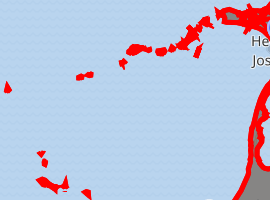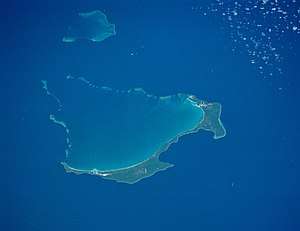Ouvéa
Ouvéa (local pronunciation: [uˈve.a]) or Uvea is a commune in the Loyalty Islands Province of New Caledonia, an overseas territory of France in the Pacific Ocean. The settlement of Fayaoué [faˈjawe], on Ouvéa Island, is the administrative centre of the commune.[1]
Ouvéa | |
|---|---|
The Uvea parakeet is endemic to Ouvéa Island | |
Location of the commune (in red) within New Caledonia | |
Location of Ouvéa 
| |
| Coordinates: 20°39′08″S 166°33′43″E | |
| Country | France |
| Sui generis collectivity | New Caledonia |
| Province | Loyalty Islands Province |
| Government | |
| • Mayor | Boniface Ounou |
| Area 1 | 132.1 km2 (51.0 sq mi) |
| Population (2019 census) | 3,401 |
| • Density | 26/km2 (67/sq mi) |
| Ethnic distribution | |
| • 2014 census | Kanaks 93.33% Europeans 1.36% Wallisians and Futunans 0.18% Mixed 0.83% Other 4.3% |
| Time zone | UTC+11:00 |
| INSEE/Postal code | 98820 /98814 |
| Elevation | 0–46 m (0–151 ft) (avg. 2 m or 6.6 ft) |
| 1 New Caledonia Land Register (DITTT) data, which exclude lakes and ponds larger than 1 km² (0.386 sq mi or 247 acres) as well as the estuaries of rivers. | |
Geography
Ouvéa is made up of Ouvéa Island, the smaller Mouli Island and Faiava Island, and several islets around these three. All lie among the Loyalty Islands, to the northeast of New Caledonia's mainland.
History
Ouvéa is a Polynesian outlier originally settled by Polynesian navigators who named it for their home island, Uvea Island. Some of their descendants still speak the West Uvean language.
Kanak activism
In April 1988, a hostage taking took place on Ouvéa. Four gendarmes were killed and twenty-seven were held hostage in a cave by supporters of the Kanak and Socialist National Liberation Front. Twelve of the captured gendarmes were released after a while, but six members of a French anti-terrorist squad were also taken hostage. When negotiations to release the hostages did not succeed, French security forces besieged the cave and freed them. Eighteen Kanaks and two gendarmes were left dead. In the aftermath it was alleged that three Kanaks had been executed or left to die after being arrested.
Languages
The native languages of Ouvéa are the Melanesian Iaai and the Polynesian Faga Uvea, which is the only Polynesian language that has taken root in New Caledonia. Speakers of Faga Uvea have fully integrated into the Kanak society and consider themselves Kanak.
